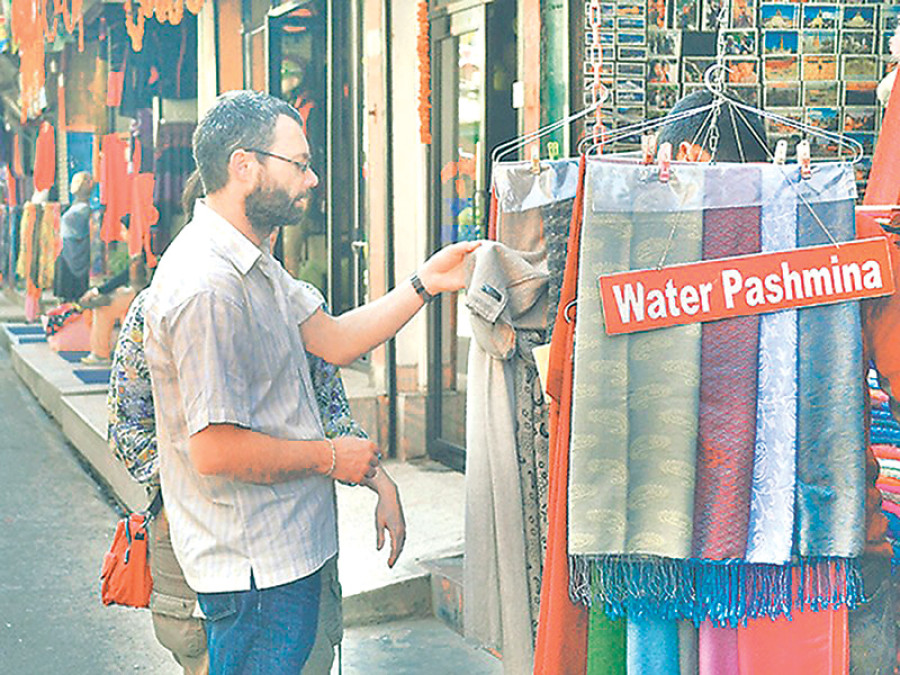Thu, Feb 26, 2026
Money
Plan to set up pashmina wool processing centres in limbo
Manufacturers of pashmina products are not enthusiastic about establishing pashmina wool processing centres in various parts of the country as proposed by the government, as they have said the budget of Rs6 million allocated for the purpose is “insufficient”.
bookmark
Published at : April 2, 2018
Updated at : April 2, 2018 08:32
Kathmandu
Manufacturers of pashmina products are not enthusiastic about establishing pashmina wool processing centres in various parts of the country as proposed by the government, as they have said the budget of Rs6 million allocated for the purpose is “insufficient”.
The government, for the last few years, has been talking about establishing wool processing centres in Manang, Mustang and Dolpa districts, which have high potential to produce the raw material for pashmina products. These centres, according to the government, would create a strong “backward linkage” for the Nepali pashmina industry, which has helped the country to promote its exports.
But the plan to establish wool processing centres did not materialise in the past because of failure to allocate budget. However, the current financial year’s fiscal policy incorporates a programme on installation of wool processing plants under the public private partnership model.
As per this plan, the Ministry of Industry, Commerce and Supplies is preparing to provide the fund to pashmina producers through Trade and Export Promotion Centre (TEPC).
“But we have declined to accept the fund, as it is too little,” said Durga Bikram Thapa, president of the Nepal Pashmina Industries Association. According to him, a fund of at least of Rs32.5 million is required to install the wool processing centre in each district. Of this cost, 80 percent, or around Rs26 million, must be borne by the government, added Thapa.
“We also don’t know whether the budget would be allocated every year to operate the wool processing units, as shortage of funds in the successive years would lead to closure of those centres,” said Thapa.
If the government had allocated adequate budget, pashmina producers were planning to set up the first wool processing centre in Mustang.
Pashmina is one of the top 10 foreign currency earners for Nepal. Nepal exported pashmina products worth Rs1.43 billion in the first seven months of this fiscal year, according to TEPC. However, the sector has to depend on imported raw materials, which has raised production cost and prevented producers from maintaining uniformity in quality of pashmina products.
Nepal imports pashmina wool mostly from India, China and Mongolia. According to the association, the domestic production of chyangra wool contributes to mere 2 percent of the required raw material.
Pashmina wool is extracted from chyangra, a variant of goat that is reared in
high hilly regions of the country. As of now, efforts are being made by a handful of entrepreneurs to process wool. For instance, Byabasayik Krishi Sahakari, an agricultural cooperative based in Baluwatar, Kathmandu, has been processing wool collected in coordination with farmers of Mustang and Upper Mustang for the last few years. But the country does not have a processing plant to produce pashmina yarn at a commercial level. Due to lack of plants to process pashmina wool in significant quantity, local farmers are compelled to sell their products to Tibetan traders at lower rates.
Around 300,000 chyangras are reared in the high hilly regions, including Mustang, Humla, Mugu and Dolpa districts, according to a report prepared by the International Trade Centre, a subsidiary of the World Trade Organisation, in 2014. As per the study, 55,000 chyangras are being raised in Mustang district alone. An estimated 8 tonnes of pashmina wool can be produced from them annually.
Most Read from Money
Editor's Picks
Upper house passes tourism bill with tougher Everest rules
What Routine of Nepal Banda gets right, and what it gets wrong
The murky business of room finding in Kathmandu
Nepal’s share market faces unprecedented lockdown as regulators battle industry over trading rules
Ministries differ over extending Indian HICDP aid beyond local governments
E-PAPER | February 26, 2026
×




 8.26°C Kathmandu
8.26°C Kathmandu













